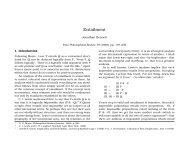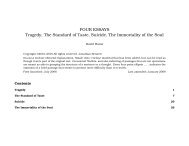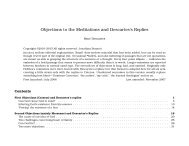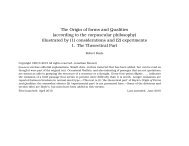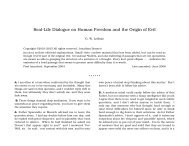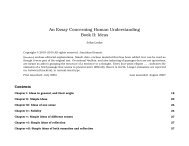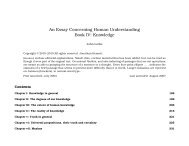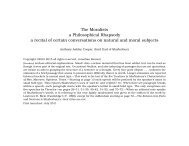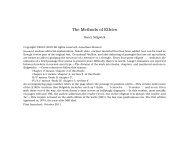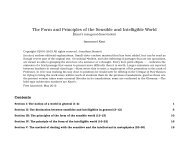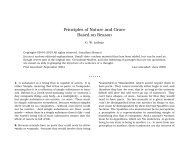A Vindication of the Rights of Woman with - Early Modern Texts
A Vindication of the Rights of Woman with - Early Modern Texts
A Vindication of the Rights of Woman with - Early Modern Texts
Create successful ePaper yourself
Turn your PDF publications into a flip-book with our unique Google optimized e-Paper software.
The <strong>Rights</strong> <strong>of</strong> <strong>Woman</strong> Mary Wollstonecraft 2: Current views about sexual differences<br />
<strong>of</strong>ten have been gratified by <strong>the</strong> sight <strong>of</strong> humble mutual love,<br />
not dignified by sentiment or streng<strong>the</strong>ned by a union in<br />
intellectual pursuits. The domestic trifles <strong>of</strong> <strong>the</strong> day have<br />
provided material for cheerful conversation, and innocent caresses<br />
have s<strong>of</strong>tened toils which didn’t require great exercise<br />
<strong>of</strong> mind or stretch <strong>of</strong> thought. But hasn’t <strong>the</strong> sight <strong>of</strong> this<br />
middling happiness aroused more tenderness than respect?<br />
It is an emotion like what we feel when we see children are<br />
playing; 4 whereas <strong>the</strong> contemplation <strong>of</strong> <strong>the</strong> noble struggles<br />
<strong>of</strong> suffering merit has created admiration and carried our<br />
thoughts to that world where sensation will give place to<br />
reason.<br />
So women are to be considered ei<strong>the</strong>r as •moral beings<br />
or as •so weak that <strong>the</strong>y must be entirely subjected to <strong>the</strong><br />
superior faculties <strong>of</strong> men.<br />
Let us examine this question. Rousseau declares that<br />
a woman should never for a moment feel herself to be<br />
independent, that she should be •governed by fear to exercise<br />
her ‘natural’ cunning, and •made a coquettish slave in order<br />
to make her a more alluring object <strong>of</strong> desire, a ‘sweeter’<br />
companion to man whenever he chooses to relax himself. He<br />
carries his arguments (which he claims to infer from <strong>the</strong> indications<br />
<strong>of</strong> nature) still fur<strong>the</strong>r, and indicates that truth and<br />
fortitude—<strong>the</strong> corner-stones <strong>of</strong> all human virtue—should be<br />
cultivated <strong>with</strong> certain restrictions, because <strong>with</strong> respect to<br />
<strong>the</strong> female character obedience is <strong>the</strong> great lesson which<br />
ought to be impressed ·on <strong>the</strong> woman· <strong>with</strong> unrelenting<br />
rigour.<br />
What nonsense! When will a great man arise <strong>with</strong> enough<br />
strength <strong>of</strong> mind to puff away <strong>the</strong> fumes that pride and<br />
sensuality have thus spread over <strong>the</strong> subject? If women are<br />
by nature inferior to men, <strong>the</strong>ir virtues must be ·comparable<br />
<strong>with</strong> men’s, meaning that <strong>the</strong>y must be· <strong>the</strong> same in quality<br />
if not in degree. . . .; so <strong>the</strong>ir conduct should be based on<br />
<strong>the</strong> same principles as men’s conduct, and should have <strong>the</strong><br />
same aim.<br />
Connected <strong>with</strong> man as daughters, wives, and mo<strong>the</strong>rs,<br />
<strong>the</strong> moral character <strong>of</strong> women may be judged by how <strong>the</strong>y<br />
fulfill those simple duties; but <strong>the</strong> great end <strong>of</strong> <strong>the</strong>ir exertions<br />
should be to develop <strong>the</strong>ir own faculties and acquire <strong>the</strong><br />
dignity <strong>of</strong> conscious virtue. They may try to make <strong>the</strong>ir road<br />
pleasant; but <strong>the</strong>y should never forget, as men do, that life<br />
doesn’t yield <strong>the</strong> happiness that can satisfy an immortal<br />
soul. I don’t mean to imply that ei<strong>the</strong>r sex should be so<br />
lost in abstract reflections or distant views as to forget <strong>the</strong><br />
affections and duties that •lie before <strong>the</strong>m and •are indeed<br />
<strong>the</strong> means appointed to produce <strong>the</strong> fruit <strong>of</strong> life; on <strong>the</strong><br />
contrary, I warmly recommend <strong>the</strong>m even while I say that<br />
<strong>the</strong>y give most satisfaction when <strong>the</strong>y are considered in <strong>the</strong>ir<br />
true subordinate light. [These ‘affections and duties’ are presumably<br />
ones relating to sexual intercourse, <strong>the</strong> ‘appointed means’ to continuing<br />
<strong>the</strong> species.]<br />
The dominant opinion that woman was created for man<br />
may have been inferred from Moses’s poetical story; but<br />
presumably very few who have thought about <strong>the</strong> subject<br />
ever believed that Eve was literally one <strong>of</strong> Adam’s ribs; so that<br />
inference must be dropped—or be admitted only as proving<br />
from <strong>the</strong> remotest antiquity man found it convenient to exert<br />
•his strength to subjugate his companion, and •his invention<br />
to show that she ought to have her neck bent under <strong>the</strong> yoke<br />
because she as well as <strong>the</strong> lower animals was created to do<br />
his pleasure.<br />
Don’t think I that I want to invert <strong>the</strong> order <strong>of</strong> things. I<br />
have already conceded that <strong>the</strong> constitution <strong>of</strong> men’s bodies<br />
4 Milton’s pleasing picture <strong>of</strong> •paradisiacal happiness has always raised similar feelings in me; but instead <strong>of</strong> envying <strong>the</strong> lovely pair, I have <strong>with</strong><br />
conscious dignity (or satanic pride!) turned to •hell for more sublime things to think about. . . .<br />
17



